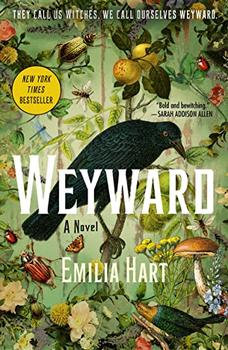Summary | Excerpt | Reading Guide | Reviews | Beyond the Book | Readalikes | Genres & Themes | Author Bio

A Novel
by Emilia HartChapter Seven
ALTHA
The guards took me down a cramped stone staircase to the dungeon. If the castle had swallowed me, now it had me in its bowels; for here it was even darker than where they'd held me in the village.
My gut churned between hunger and sickness, thirst clawing at my throat. My heart hammered at the sight of the heavy wooden door. I was already so weak. I did not know how much longer I would last.
But they gave me provisions, this time, before they locked me away—a thin blanket, a pot, and a pitcher of water. And an old hunk of bread, which I ate slowly, biting off tiny amounts and chewing until the saliva flooded my mouth.
I only took note of my surroundings once I had eaten my fill, my shrunken stomach cramping. They had given me no candle, but there was a small grate set high in the wall, letting in the last embers of the day.
The stone walls felt cold to the touch, and when I took my fingers away, they were damp. A dripping sound came from some- where, echoing like a warning.
The straw beneath my feet was sodden, moldering; the sweet rot mingling with the reek of old piss. There was another smell, too. I thought of all who had been held there before me, growing pale as mushrooms in the dark, awaiting their fate. It was their fear I could smell, as if it had bled into the air, seeped into the stone.
The fear hummed within me, gave me strength for what I had to do.
I pulled up my shift so that my belly met with the chill air. Then, gritting my teeth I began to scratch, fingernails tearing at the tiny bauble of flesh below my rib cage. Below my heart.
Just when I was sure that I could bear the pain no longer, I felt flesh come away, then the thick wetness of blood, its sweet tang filling the air. I wished that I had honey, or some thyme, to make a poultice for the wound; instead, I made do with some water from the pitcher. When I had cleaned it as best I could, I lay down and drew the blanket over me. The straw did little against the stone floor, and my bones rang with the cold.
Only then did I allow myself to think of home: my little rooms, neat and bright with jars and vials; the moths that danced round my candles at night. And outside, my garden. My heart ached at the thought of my plants and flowers, my dear nanny goat who kept me in milk and comfort, the sycamore that sheltered me with its boughs. For the first time since they'd torn me from my pallet, I let myself sob. I wondered if I would die of the loneliness before they had the chance to hang me. But at that moment, something brushed my skin, as delicate as a kiss. It was a spider, its legs and pincers blue with moonlight. My new friend crawled into the hollow between my neck and shoulder, clinging to my hair. I thanked it for its presence, which did more to lift my spirit than even the bread and water.
As I watched a moonbeam dance through the grate, I wondered who would give testimony against me the next day. Then I thought of Grace.
I was sure I would never sleep. But it seemed the thought had barely left my mind when I was woken by the creak of the door swinging open. The spider scuttled away at the burn of torchlight, and my heart lurched at the sight of a man in Lancaster livery. Court would begin shortly, he said. I was to make myself presentable.
He gave me a kirtle, spun of rough cloth and smelling of sweat. I did not like to think who had worn it before me, where they were now. I winced at the feel of the cloth against my wound, but when the man returned, I was glad that I had on a proper dress, even if it was crudely made. I wished I had a cap, or something to neaten my hair with, for it hung about my face in rags. Adding to my shame.
My mother always taught me that cleanliness commands respect, and that respect was worth more than all the king's gold—to us, especially, seeing as we often had little of either. We had washed every week. No smell of curdled sweat hung around the Weyward women, not even in high summer. Instead, we smelled of lavender, for protection. I wished I had some lavender now. But all I had were my wits, dulled as they were by lack of proper food and sleep.
From Weyward by Emilia Hart. Copyright © 2023 by the author and reprinted by permission of St. Martin's Publishing Group.
People who bite the hand that feeds them usually lick the boot that kicks them
Click Here to find out who said this, as well as discovering other famous literary quotes!
Your guide toexceptional books
BookBrowse seeks out and recommends the best in contemporary fiction and nonfiction—books that not only engage and entertain but also deepen our understanding of ourselves and the world around us.